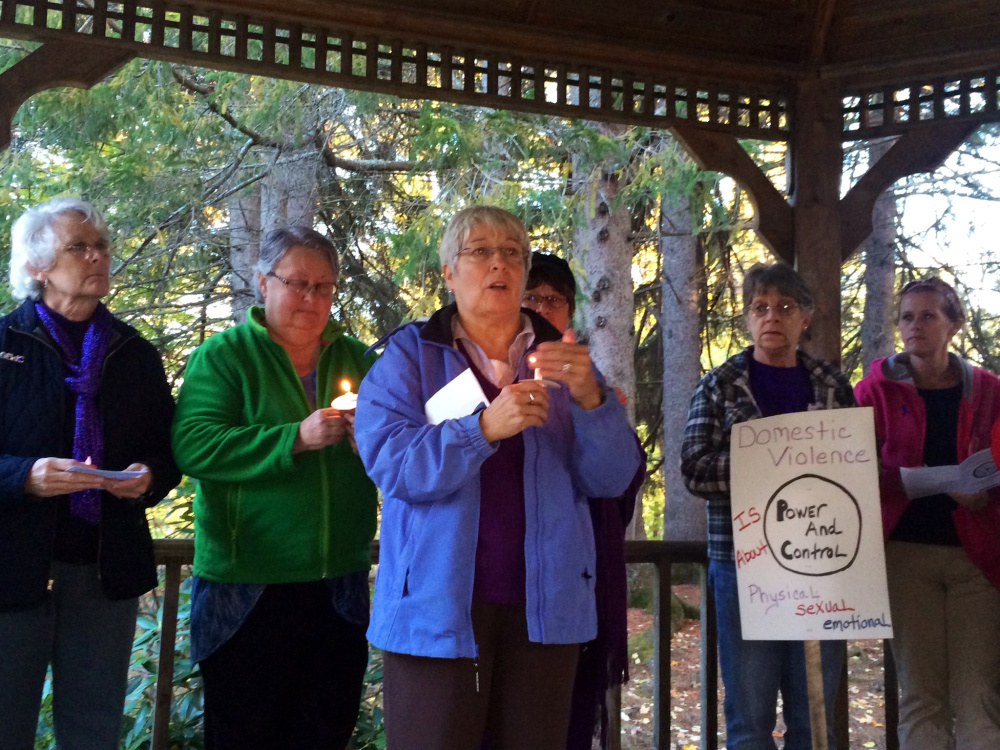On the first day of this month, advocates for victims of domestic and sexual violence, stalking and dating violence gathered on the steps of Portland City Hall.
With Mayor Michael Brennan, Portland Police Chief Michael Sauschuck and Sister Patricia Pora, community advocate for the Latino/Hispanic communities, we assembled to state publicly and emphatically that this community does not tolerate domestic abuse, and that we will individually and collectively do everything we can to enhance victim safety and improve offender accountability.
To quote Sister Pora: “We tend to feel safer when we think that violence happens somewhere else and to someone else, but it is often hidden in our own families and neighborhoods. We are all accountable for our family and our community, so we need to look at our communities from the inside.”
Here is some information about how the issue of domestic violence is affecting our community and the state of Maine:
• Nationally, intimate partner violence accounts for 15 percent of all crime, according to the U.S. Justice Department’s Bureau of Justice Statistics. In contrast, in Maine in 2013, domestic violence assaults represented nearly half (47 percent) of all assaults reported to law enforcement. And it is safe to assume that many assaults that occur between family members and domestic or dating partners are not reported.
• Twenty-one homicides were committed in Maine in 2014. Fourteen were domestic homicides. This shows a significant increase in the decades-long trend in Maine whereby about half of the homicides each year are domestic crimes – a 32 percent increase, from 50 percent to 66 percent. Tragically, six of the 14 victims were children.
• Last year, Maine’s domestic violence resource centers served 12,399 people, answering over 40,000 hotline calls. We provided almost 30,000 nights in our emergency shelters for victims of abuse and violence.
In addition to these core services, we work with law enforcement, in the courts, in the child protective services system and on special initiatives to address the many barriers to victim safety.
October is Domestic Violence Awareness Month, a good time to learn more about domestic violence, its effects and what you can do to help.
If you or someone you know is experiencing abuse in a relationship (or if you are not sure or just want to learn more), call our hotline. A trained advocate is available 24 hours a day, seven days a week, at 1-800-537-6066. The service is free, anonymous and confidential.
Recognizing that someone is being abused is not as easy as spotting bruises. People who are being abused may be fearful of their partner, but they may also be defiant. The dated picture of the battered woman cowering in the corner does not show the full spectrum of people being victimized by a partner or family member. Because abuse can happen to anyone, there is no typical victim.
Abusers may be difficult to spot immediately. Some may be aggressive in public, while others may be charming when other people are around. Characteristics such as jealousy may be couched in seemingly romantic terms: always wanting to be together, frequent phone calls to say hello. A key tactic of domestic abuse is isolation. Abusers often try to cut off their partner from supports in order to gain control.
Each one of us will, on occasion, find ourselves in a position to notice abuse and its effects. You can:
• Listen to people who are being abused without judgment, and offer Family Crisis Services’ toll-free number (1-800-537-6066) for support, advocacy and safety planning.
• Speak out against abusive behavior when you see it and contact law enforcement if a crime is being committed.
• Know that your words and actions may not seem to have an immediate impact. Trying to help a friend or family member may not “fix it.” However, your words of support and encouragement may sustain and reinforce someone who is experiencing abuse; your words of disapproval and refusal to condone abusive behaviors may persuade someone to stop being abusive.
Noticing and acting is important. It may even encourage others to do the same.
• Learn more about the dynamics and tactics of abuse. There are great resources on the Web. Check out the links on our website: familycrisis.org.
• Be an engaged citizen in local and national efforts to reduce violence in our community – be informed and vote.
• Consider joining Family Crisis Services as a volunteer or community supporter.
All of us together can improve the safety of victims of abuse and hold offenders accountable.
Send questions/comments to the editors.


